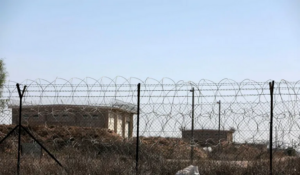Israeli prisons for Gaza detainees cannot become a black hole of human rights violations

The Sde Teiman military base in southern Israel.
The Haaretz lead editorial on 2 December 2024:
Many of the Gazans who have been arrested by the army and brought to Israel Defense Forces jails have disappeared without a trace. Their families don’t know where they are, whether they are alive or dead and, if they are dead, how they died.
Over the last month, another two Gazans at least have met their end in the black hole of detention facilities in Israel. Muad Khaled Mohammed Rian, 31, was arrested on October 31 in northern Gaza even though he was paralyzed, and he died roughly a week and a half later. Israeli authorities have declined to specify the crimes of which he was suspected.
When his relatives asked the army for information about where he was being held, they were told that he had died, but not where. Only after Haaretz inquired were they then told he died in the Sde Teiman detention facility.
Mohammad Abed Al-Rahman Hawishel Idris, 35, was arrested in Rafah on August 25, according to Palestinian sources, and died last Friday at Ofer Prison. His family was told that he was found unconscious in his cell and pronounced dead after attempts to resuscitate him failed. The IDF said he died while in custody of the Prison Service. But the Prison Service said he was held by the army. In other words, both agencies are trying to shift the blame onto the other. And nobody is wiling to reveal why he was arrested.
Their deaths come on top of those of a father and son who were arrested in March in Khan Yunis. Their families’ efforts to find out what had become of them went nowhere. In July, they were told that the authorities were unaware they had been arrested. The families petitioned the High Court of Justice, and only then did the state admit that not only had the two been arrested, but they also died while in detention. The justices termed this chain of events “a mistake.”
It’s comforting to believe that this isn’t part of a policy. But in practice, many Gazans are searching for their relatives not only amid the rubble, but also within the walls of Israel’s prisons. The lack of transparency forces them to try gathering scraps of information from freed detainees or lawyers who visit the jails. And many of them remain without answers.
Since the war began, dozens of prisoners and detainees have died in detention facilities run by the IDF or the Prison Service. Yet the public is indifferent. And the Supreme Court whitewashes the detainees’ disappearance, while petitions by human rights organizations are dismissed again and again.
The state must organize a system that will tell detainees’ families where they are and what has become of them. And judges in both the civil and the military courts have an obligation to visit the detention facilities to ensure that the detainees are held in suitable conditions. We must not accept a situation in which prisons become a black hole where the most basic human rights are serially violated.
This article is reproduced in its entirety
